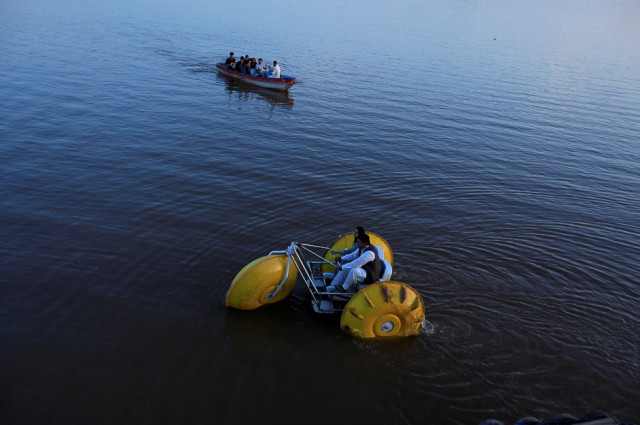SC seeks details of allotments, buildings in Rawal Lake area
Top court says demolition of thousands of houses will not be ordered

A couple rides a paddleboat down the Rawal Lake in Islamabad. PHOTO: REUTERS
A three-member bench of the apex court, headed by Chief Justice Mian Saqib Nisar, was hearing a case relating to large-scale encroachments and unplanned construction in Banigala in a suo motu action on a letter written by Pakistan Tehreek-e-Insaf (PTI) chief Imran Khan.
The letter invited the court’s attention towards unchecked and unplanned construction in Banigala, large-scale felling of trees and pollution in the Rawal Lake.
The CDA was directed by the court to submit a timeframe regarding the construction of a boundary wall to protect the zoo-cum-botanical garden in Banigala, besides asking the authority to determine who would build the wall.
IHC hints at suspending plots for govt, CDA officials
The bench also asked the Attorney General, Mian Abdur Rauf, to assist the court in this regard.
Asking the CDA and the Islamabad Capital Territory (ICT) administration to provide details on why preventive measures were not taken when illegal constructions were being carried out in the area.
The court later adjourned the hearing till the third week of June.
Imran Khan was represented by Babar Awan while Sardar Aslam appeared on behalf of the CDA. Advocate General Rauf also appeared before the court.
Babar Awan cited a CDA report, saying that it only discussed the general area of Imran’s residence without mentioning any other construction.
Justice Umar Atta Bandial said that the chief justice had initiated a suo motu action because of pollution in the Rawal Lake and encroachment on the National Park. The court, he said, would restrict itself on these matters.
When Awan, the PTI counsel, said that according to the CDA, Section 144 had been imposed to control illegal tree cutting, the chief justice said these measures were positive.
Assaulting a reporter: Three CDA employees suspended
But Awan said the measures only existed on paper, adding that the authority had conducted a survey of illegal constructions in Banigala. “But the report ignores illegal constructions on northern, eastern and western sides.”
The chief justice said the court would also look into how the land was allotted because it was state land, and the matter of illegal construction would be taken up later.
The court, he said, would also determine on whose authority these buildings were built in Banigala and which institution was currently responsible for managing construction activities there.
“This court will not order the demolition of thousands of houses … the departments concerned must decide on their own,” the apex court observed.
The apex court also sought Imran’s reply to the CDA report.
The chief justice urged the authorities concerned to speed up the pace of building the boundary wall to protect the zoological-cum-botanical garden.
CDA’s counsel Sardar Aslam said that construction in Banigala was started first by Dr Abdul Qadeer Khan in 1990s. He said that houses worth billions of rupees were built without permissions or paying taxes. He stressed the need for regularising these buildings.
Technological advancement: CDA plans complaint centres
PTI chief Imran Khan on Wednesday announced that he would present before the Supreme Court the money trail related to the sale and purchase of his property in London as well as purchase of over 37 acres of land in Bani Gala.
The PTI chief claimed that his documents would not be ludicrous as ‘Qatri’ letters submitted by Prime Minister Nawaz Sharif over his defense in Panamagate case.
“I will not only show money trail of purchase and sale of London flat and money brought back to Pakistan before the SC but also proofs that I had my Banigala house plans approved by the Union Council of Mora Noor before starting construction,” PTI chief stated on Twitter.
“In both … cases, (the proofs) won't be a Qatari letter!” he maintained.



















COMMENTS
Comments are moderated and generally will be posted if they are on-topic and not abusive.
For more information, please see our Comments FAQ